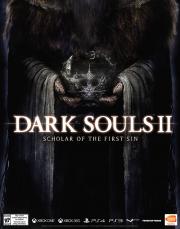Dark Souls II: Scholar of the First Sin
The landscape of Dark Souls II: Scholar of the First Sin is a theater of decay. Castles crumble into the sea, forests choke with silence, and even the sun itself seems weary, its light dimmed into a perpetual dusk. To walk these corridors is not to conquer, but to confront the absurd: the undeniable gulf between the hunger for meaning and the indifference of the world.
The gameplay is a ritual of repetition. Each enemy’s blade, each treacherous cliff, exposes the fragility of the player. Defeat is not an aberration but a constant companion. Yet it is precisely this inevitability of failure that gives shape to the experience. One does not play to overcome death, but to affirm the act of rising again. The slow rhythm of combat, heavier and less refined than that of its predecessor, demands patience—an acknowledgment that progress comes not from brilliance but from persistence.
In this way, the game embodies the very struggle of Sisyphus. Every life begins at a bonfire, a momentary reprieve, before the boulder must be pushed once more up the hill of Drangleic’s ruins. Victory, when it comes, is fleeting: a boss falls, and the silence of the world swallows the triumph. But there is no despair here, only the stark realization that life is composed of these cycles—struggle, failure, renewal.
What redeems this desolation is the quiet dignity that arises from continuing. The player knows the abyss waits, yet steps forward. The journey becomes less about transcendence and more about acceptance: the acknowledgment that in a ruined world, meaning is not granted but created in the act of perseverance itself.
Thus Dark Souls II: Scholar of the First Sin is not a tale of glory. It is a meditation on endurance, a reminder that even in futility there is a form of freedom. To persist in such a world is to affirm life, even as it withholds its answers.
The gameplay is a ritual of repetition. Each enemy’s blade, each treacherous cliff, exposes the fragility of the player. Defeat is not an aberration but a constant companion. Yet it is precisely this inevitability of failure that gives shape to the experience. One does not play to overcome death, but to affirm the act of rising again. The slow rhythm of combat, heavier and less refined than that of its predecessor, demands patience—an acknowledgment that progress comes not from brilliance but from persistence.
In this way, the game embodies the very struggle of Sisyphus. Every life begins at a bonfire, a momentary reprieve, before the boulder must be pushed once more up the hill of Drangleic’s ruins. Victory, when it comes, is fleeting: a boss falls, and the silence of the world swallows the triumph. But there is no despair here, only the stark realization that life is composed of these cycles—struggle, failure, renewal.
What redeems this desolation is the quiet dignity that arises from continuing. The player knows the abyss waits, yet steps forward. The journey becomes less about transcendence and more about acceptance: the acknowledgment that in a ruined world, meaning is not granted but created in the act of perseverance itself.
Thus Dark Souls II: Scholar of the First Sin is not a tale of glory. It is a meditation on endurance, a reminder that even in futility there is a form of freedom. To persist in such a world is to affirm life, even as it withholds its answers.
Mini Review: The world of Dark Souls II: Scholar of the First Sin unfolds like a parable of futility—each corridor filled with decay, each enemy a mirror of our persistence. The combat is deliberate, less graceful than its kin, yet it compels us forward. What endures is not triumph, but the quiet dignity of continuing despite knowing the abyss waits.

